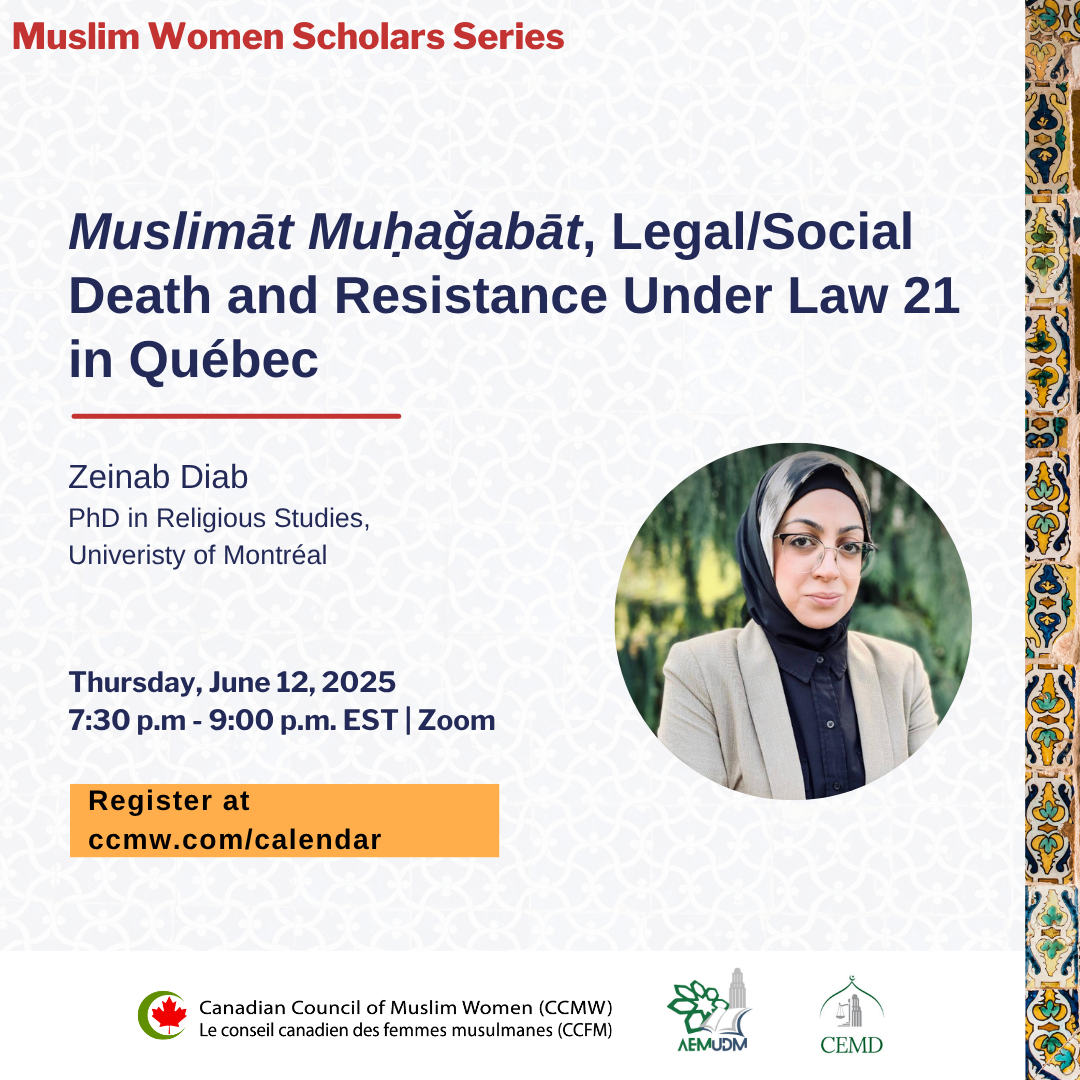CCMW Muslim Women Scholars Series: June Edition
Muslimāt Muḥaǧabāt, Legal/Social Death and Resistance Under Law 21 in Québec
Join us on June 12th at 7:30pm ET for our next Muslim Women Scholars Series seminar, presented by the Canadian Council of Muslim Women (CCMW).
Speaker: Zeinab Diab
Abstract: Québec’s laïcité law (Law 21) has profoundly reshaped the lived experiences of Muslim women who practice the hijab (Muslimāt Muḥaǧabāt), particularly those in the education sector. By invoking the notwithstanding clause, this law suspends 38 fundamental rights and freedoms enshrined in the Québec Charter, as well as sections 2 and 7 to 15 of the Canadian Charter of Rights and Freedoms—placing Muslim women in a state of legal exception and a radical Other. This legal marginalization translates into social death, which manifests through three key elements: the loss of social and professional identity, the breakdown of social ties, and a reconfiguration of embodied self-perception, as women are forced to negotiate their visibility and existence under conditions of exclusion.
This presentation, grounded in participatory action research conducted with 21 Muslimāt Muḥaǧabāt, critically examines the paradoxes of Québec’s secularism, the intersection of Islamophobia and gendered racism, and the ways in which those impacted resist erasure and reclaim their right to exist. More than a policy, Law 21 institutionalizes gendered Islamophobia, reinforcing systemic discrimination that targets Muslim women’s presence in public life. However, rather than leading to passive resignation, this social death has also given rise to new forms of resistance and survival, including a reinvestment in faith—not only as a spiritual refuge but as a political force that fuels their capacity to act and engage in collective mobilization. Through legal battles, political advocacy, community activism and everyday negotiations, the women affected by this law reclaim agency, challenging the state’s claim to secular neutrality and redefining their place in society.
About Zeinab Diab
Originally from southern Lebanon and raised in Montréal since 1989, Zeinab Diab is a PhD graduate in Religious Studies and a researcher specializing in the critical study of secularism policies and their impact on Muslim women who practice hijab, particularly in Québec. Her doctoral research, conducted at the Institute of Religious Studies at the University of Montréal and funded by the Fonds de recherche du Québec – Société et Culture (FRQSC), explores the effects of Law 21 on fundamental rights, the institutionalization of gendered Islamophobia, and the resulting dynamics of social death. It also examines how resistance and hope are constructed through faith and community. Beyond academia, Zeinab actively engages in public debates, collaborating with advocacy organizations and contributing to conferences. She was selected as an expert by the National Council of Canadian Muslims (NCCM) for a major research project on the impact of Law 21 on Muslim women in Québec. Her work has been published in Secularism, Race, and the Politics of Islamophobia (University of Alberta Press), and she continues to explore issues of secularism, Islamophobia, social justice, and decolonial thought.
Community Partners
This seminar is presented in partnership with:
The Muslim Students’ Association of the University of Montreal (Association des étudiants musulmans de l’Université de Montréal – AEMUDM)
The Muslim Law Students’ Committee at the University of Montreal (Comité des étudiant.e.s musulman.e.s en droit de l’UdeM – CEMD)
The Middle Eastern and North African Law Students’ Association at the University of Ottawa (Association des étudiants en droit du Moyen-Orient et de l’Afrique du Nord – University of Ottawa)
About Muslim Women Scholars Series
The Canadian Council of Muslim Women (CCMW) is pleased to present the Muslim Women Scholars Series. One of CCMW's strategic goals is to promote critical thinking among Muslims and non-Muslims to challenge stereotypes and assumptions about Islam, Muslim women and their families. One way of doing this is to feature the work of contemporary Muslim women scholars focusing on diverse topics related to Muslim women.
For more information or partnership opportunities, email us at events@ccmw.com.


